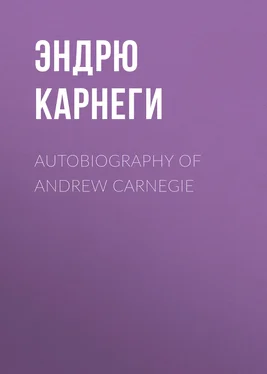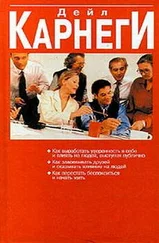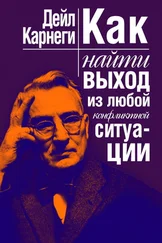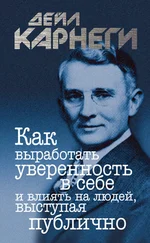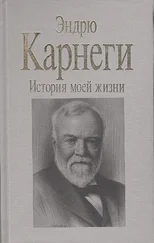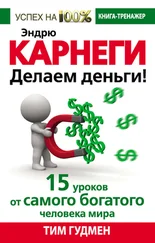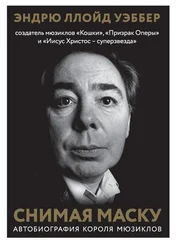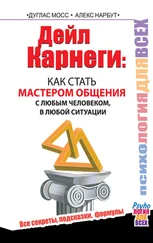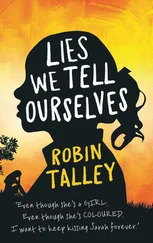Эндрю Карнеги - Autobiography of Andrew Carnegie
Здесь есть возможность читать онлайн «Эндрю Карнеги - Autobiography of Andrew Carnegie» — ознакомительный отрывок электронной книги совершенно бесплатно, а после прочтения отрывка купить полную версию. В некоторых случаях можно слушать аудио, скачать через торрент в формате fb2 и присутствует краткое содержание. Жанр: Биографии и Мемуары, foreign_antique, на английском языке. Описание произведения, (предисловие) а так же отзывы посетителей доступны на портале библиотеки ЛибКат.
- Название:Autobiography of Andrew Carnegie
- Автор:
- Жанр:
- Год:неизвестен
- ISBN:нет данных
- Рейтинг книги:3 / 5. Голосов: 1
-
Избранное:Добавить в избранное
- Отзывы:
-
Ваша оценка:
- 60
- 1
- 2
- 3
- 4
- 5
Autobiography of Andrew Carnegie: краткое содержание, описание и аннотация
Предлагаем к чтению аннотацию, описание, краткое содержание или предисловие (зависит от того, что написал сам автор книги «Autobiography of Andrew Carnegie»). Если вы не нашли необходимую информацию о книге — напишите в комментариях, мы постараемся отыскать её.
Autobiography of Andrew Carnegie — читать онлайн ознакомительный отрывок
Ниже представлен текст книги, разбитый по страницам. Система сохранения места последней прочитанной страницы, позволяет с удобством читать онлайн бесплатно книгу «Autobiography of Andrew Carnegie», без необходимости каждый раз заново искать на чём Вы остановились. Поставьте закладку, и сможете в любой момент перейти на страницу, на которой закончили чтение.
Интервал:
Закладка:
These political meetings were of frequent occurrence, and, as might be expected, I was as deeply interested as any of the family and attended many. One of my uncles or my father was generally to be heard. I remember one evening my father addressed a large outdoor meeting in the Pends. I had wedged my way in under the legs of the hearers, and at one cheer louder than all the rest I could not restrain my enthusiasm. Looking up to the man under whose legs I had found protection I informed him that was my father speaking. He lifted me on his shoulder and kept me there.
To another meeting I was taken by my father to hear John Bright, who spoke in favor of J.B. Smith as the Liberal candidate for the Stirling Burghs. I made the criticism at home that Mr. Bright did not speak correctly, as he said "men" when he meant "maan." He did not give the broad a we were accustomed to in Scotland. It is not to be wondered at that, nursed amid such surroundings, I developed into a violent young Republican whose motto was "death to privilege." At that time I did not know what privilege meant, but my father did.
One of my Uncle Lauder's best stories was about this same J.B. Smith, the friend of John Bright, who was standing for Parliament in Dunfermline. Uncle was a member of his Committee and all went well until it was proclaimed that Smith was a "Unitawrian." The district was placarded with the enquiry: Would you vote for a "Unitawrian"? It was serious. The Chairman of Smith's Committee in the village of Cairney Hill, a blacksmith, was reported as having declared he never would. Uncle drove over to remonstrate with him. They met in the village tavern over a gill:
"Man, I canna vote for a Unitawrian," said the Chairman.
"But," said my uncle, "Maitland [the opposing candidate] is a Trinitawrian."
"Damn; that's waur," was the response.
And the blacksmith voted right. Smith won by a small majority.
The change from hand-loom to steam-loom weaving was disastrous to our family. My father did not recognize the impending revolution, and was struggling under the old system. His looms sank greatly in value, and it became necessary for that power which never failed in any emergency—my mother—to step forward and endeavor to repair the family fortune. She opened a small shop in Moodie Street and contributed to the revenues which, though slender, nevertheless at that time sufficed to keep us in comfort and "respectable."
I remember that shortly after this I began to learn what poverty meant. Dreadful days came when my father took the last of his webs to the great manufacturer, and I saw my mother anxiously awaiting his return to know whether a new web was to be obtained or that a period of idleness was upon us. It was burnt into my heart then that my father, though neither "abject, mean, nor vile," as Burns has it, had nevertheless to
"Beg a brother of the earth
To give him leave to toil."
And then and there came the resolve that I would cure that when I got to be a man. We were not, however, reduced to anything like poverty compared with many of our neighbors. I do not know to what lengths of privation my mother would not have gone that she might see her two boys wearing large white collars, and trimly dressed.
In an incautious moment my parents had promised that I should never be sent to school until I asked leave to go. This promise I afterward learned began to give them considerable uneasiness because as I grew up I showed no disposition to ask. The schoolmaster, Mr. Robert Martin, was applied to and induced to take some notice of me. He took me upon an excursion one day with some of my companions who attended school, and great relief was experienced by my parents when one day soon afterward I came and asked for permission to go to Mr. Martin's school. 8 8 It was known as Rolland School.
I need not say the permission was duly granted. I had then entered upon my eighth year, which subsequent experience leads me to say is quite early enough for any child to begin attending school.
The school was a perfect delight to me, and if anything occurred which prevented my attendance I was unhappy. This happened every now and then because my morning duty was to bring water from the well at the head of Moodie Street. The supply was scanty and irregular. Sometimes it was not allowed to run until late in the morning and a score of old wives were sitting around, the turn of each having been previously secured through the night by placing a worthless can in the line. This, as might be expected, led to numerous contentions in which I would not be put down even by these venerable old dames. I earned the reputation of being "an awfu' laddie." In this way I probably developed the strain of argumentativeness, or perhaps combativeness, which has always remained with me.
In the performance of these duties I was often late for school, but the master, knowing the cause, forgave the lapses. In the same connection I may mention that I had often the shop errands to run after school, so that in looking back upon my life I have the satisfaction of feeling that I became useful to my parents even at the early age of ten. Soon after that the accounts of the various people who dealt with the shop were entrusted to my keeping so that I became acquainted, in a small way, with business affairs even in childhood.
One cause of misery there was, however, in my school experience. The boys nicknamed me "Martin's pet," and sometimes called out that dreadful epithet to me as I passed along the street. I did not know all that it meant, but it seemed to me a term of the utmost opprobrium, and I know that it kept me from responding as freely as I should otherwise have done to that excellent teacher, my only schoolmaster, to whom I owe a debt of gratitude which I regret I never had opportunity to do more than acknowledge before he died.
I may mention here a man whose influence over me cannot be overestimated, my Uncle Lauder, George Lauder's father. 9 9 The Lauder Technical College given by Mr. Carnegie to Dunfermline was named in honor of this uncle, George Lauder.
My father was necessarily constantly at work in the loom shop and had little leisure to bestow upon me through the day. My uncle being a shopkeeper in the High Street was not thus tied down. Note the location, for this was among the shopkeeping aristocracy, and high and varied degrees of aristocracy there were even among shopkeepers in Dunfermline. Deeply affected by my Aunt Seaton's death, which occurred about the beginning of my school life, he found his chief solace in the companionship of his only son, George, and myself. He possessed an extraordinary gift of dealing with children and taught us many things. Among others I remember how he taught us British history by imagining each of the monarchs in a certain place upon the walls of the room performing the act for which he was well known. Thus for me King John sits to this day above the mantelpiece signing the Magna Charta, and Queen Victoria is on the back of the door with her children on her knee.
It may be taken for granted that the omission which, years after, I found in the Chapter House at Westminster Abbey was fully supplied in our list of monarchs. A slab in a small chapel at Westminster says that the body of Oliver Cromwell was removed from there. In the list of the monarchs which I learned at my uncle's knee the grand republican monarch appeared writing his message to the Pope of Rome, informing His Holiness that "if he did not cease persecuting the Protestants the thunder of Great Britain's cannon would be heard in the Vatican." It is needless to say that the estimate we formed of Cromwell was that he was worth them "a' thegither."
It was from my uncle I learned all that I know of the early history of Scotland—of Wallace and Bruce and Burns, of Blind Harry's history, of Scott, Ramsey, Tannahill, Hogg, and Fergusson. I can truly say in the words of Burns that there was then and there created in me a vein of Scottish prejudice (or patriotism) which will cease to exist only with life. Wallace, of course, was our hero. Everything heroic centered in him. Sad was the day when a wicked big boy at school told me that England was far larger than Scotland. I went to the uncle, who had the remedy.
Читать дальшеИнтервал:
Закладка:
Похожие книги на «Autobiography of Andrew Carnegie»
Представляем Вашему вниманию похожие книги на «Autobiography of Andrew Carnegie» списком для выбора. Мы отобрали схожую по названию и смыслу литературу в надежде предоставить читателям больше вариантов отыскать новые, интересные, ещё непрочитанные произведения.
Обсуждение, отзывы о книге «Autobiography of Andrew Carnegie» и просто собственные мнения читателей. Оставьте ваши комментарии, напишите, что Вы думаете о произведении, его смысле или главных героях. Укажите что конкретно понравилось, а что нет, и почему Вы так считаете.
